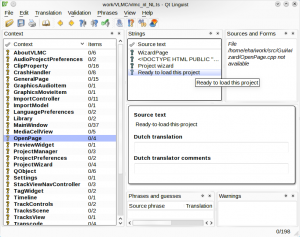VLMC
 In the past week, I have been messing a bit with the VideoLAN Movie Creator (VLMC). This is a new project – not yet released in a stable version – from the VideoLAN developer community. It is meant to become “a free video editing software, offering features to realize semi-professional quality movies, but with the aim to stay simple and user-friendly.”
In the past week, I have been messing a bit with the VideoLAN Movie Creator (VLMC). This is a new project – not yet released in a stable version – from the VideoLAN developer community. It is meant to become “a free video editing software, offering features to realize semi-professional quality movies, but with the aim to stay simple and user-friendly.”
The VLMC project has not yet released source releases, let alone pre-compiled binaries. The only place to go is the git repository and checkout the source code. Not everybody wants to try and have a go at retrieving source code from a git repository, so I have written a Slackware build script to create a proper package. The VLMC has a single dependency, which is libvlc. This library is part of the VLC multimedia player. Many of you may already have installed VLC on their machine, but there is a complication: VLMC requires bleeding-edge VLC source code, i.e. you will have to use a git snapshot for VLC as well. Building a package from VLC’s git code does not work out-of-the-box using my vlc.SlackBuild which currently produces a package for the stable 1.0.4 release. Several changes to the script were needed to adjust for new and obsoleted features.
I decided not to add my Slackware package for the VLC “snapshot build” to my Slackware package repository because this is unstable code, and I (as well as the VLC developers) can not guarantee that it works at all at any given time. Therefore I have created a place on the internet to share the VLC and VLMC packages that need to be installed together (note that this VLC package necessarily replaces any other version of VLC you may have installed, but that is the price you pay for your desire to be an early tester of VLMC…)
See http://alien.slackbook.org/vlmc_testing/ for the packages. From time to time I may decide to update the snapshot versions.
Translating a Qt applications
One thing I noticed is that VLMC still lacks a dutch translation. I think it will be nice to have a dutch translation of this program once it has been released, because I think it will become popular in the way VLC is already popular.
I have never translated a Qt application, so I had to look up how to approach this. It turns out that Slackware’s Qt package already contains all the tools required for the job! In order to create a language translation for a Qt application, you need the Qt Linguist application, which is a GUI for working with “*.ts” translation files. This program was hidden on my hard disk… it does not show up in my KDE menu. You can start it by running “linguist“. In KDE, you can press <Alt><F2> to open the command run interface.
First of course, I needed to extract all the text strings from the VLMC source code that are in need of translation. And to create this initial “.ts” file, Slackware’s Qt package contains the “lupdate” tool which is a commandline utility. This is how I created the file “vlmc_nl_nl_NL.ts” which is my starting point for the duch translation:
$ cd vlmc-20100111
$ LANG=nl_NL lupdate vlmc.pro -ts ts/vlmc_nl_nl_NL.ts
I then proceeded with starting Qt Linguist and loading this new “.ts” file. Next comes the task of adding dutch translations for the original english strings. Well… here I am, with a nice GUI and no time…
This is something I need to finish some other time I’m afraid. To get this exactly right I need to install the dutch language translation file for KDE and learn about the commonly used dutch phrases in order to make the dutch version of VLMC “blend in” with the rest of KDE. I really hope to work on this soon and send the fruit of my labour to the VLMC developers… time’s up for tonight.
Note: Documentation for Qt Linguist is available online: http://doc.trolltech.com/4.6/linguist-manager.html
Have fun! Eric

A Dutch translation was added by me!
Greetings,
Steven